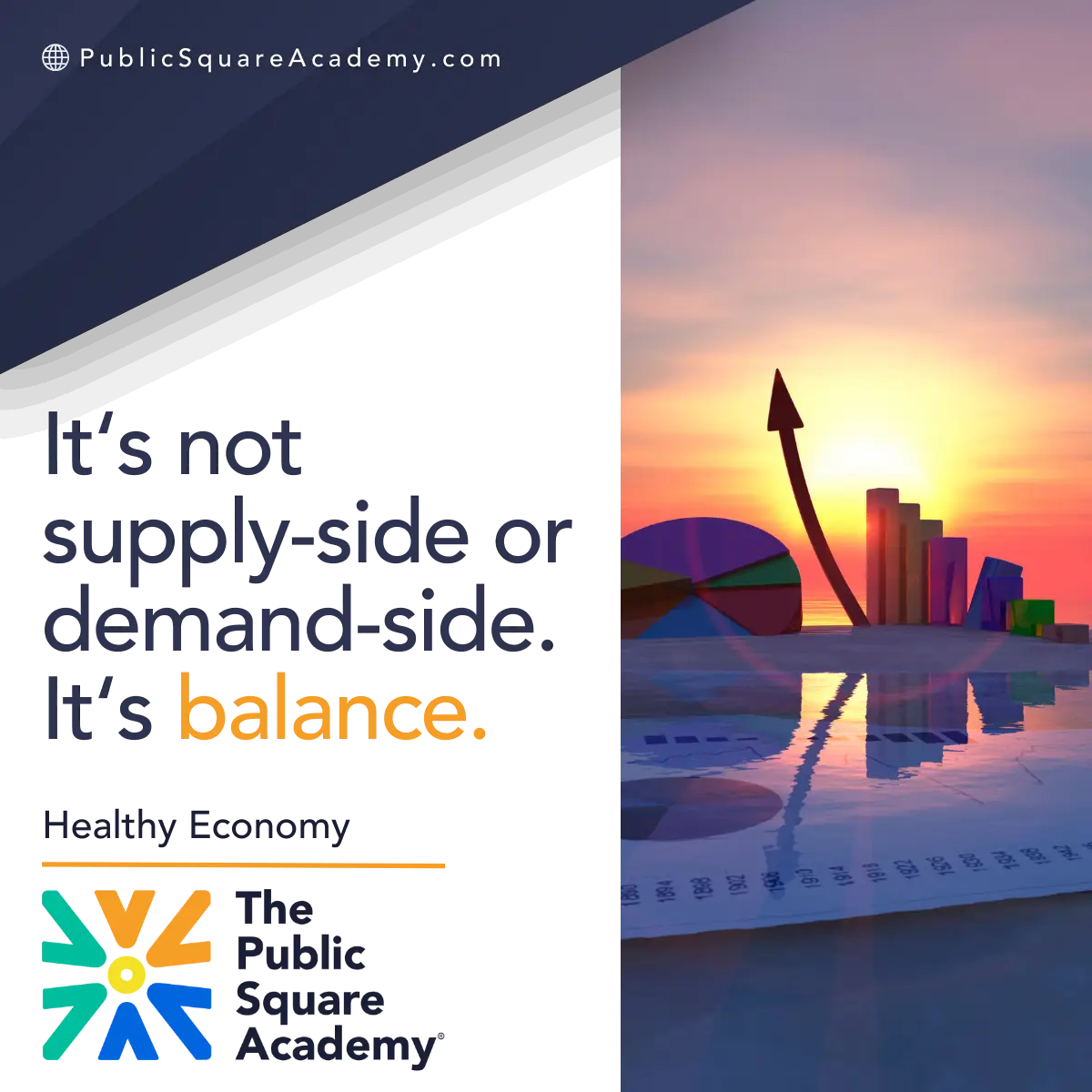“In a healthy economy, empowering, sustaining and efficiency innovations operate in balance. A healthy economy creates and sustains more jobs before squeezing out inefficiencies.”
– Clayton M. Christensen
A healthy society and economy provide broad opportunities for all citizens: Livable wages, advancing careers that offer various choices for work-life balance, and the opportunity for all to become financially secure.
Private business is the primary engine for innovation and efficient growth, but there are some initiatives that business cannot or will not take on. Academic institutions, NGOs, and governments provide critical research, development, and operational services for society’s needs.
A healthy economy should be designed to thrive, not grow | Kate Raworth
Foundations, principles, and values
There is a continual balancing act between organizations, entrepreneurs, employees, government agencies, health and well-being values, and economic necessity and vibrancy. The GDP (Gross Domestic Product), our primary measure of societal success, favors economic growth over health. However, the GDP includes unhealthy products and services like tobacco, alcohol, gambling, and polluting industries. The GDP reflects the goals and measures only of economic growth. An alternate measure is GDH, Gross Domestic Happiness. Scandinavian countries rank highest, with the U.S. at #19. We manage to what we measure.
Some organizations are so successful that they come to dominate their markets. When economic power is concentrated in too few organizations, we have an oligopoly or monopoly, which requires regulatory intervention. In some cases, it just makes sense for a monopoly to operate in their market (utilities, for example).
When citizens cannot live an economically viable life, when we cannot provide the basics of food and shelter, any of us would be tempted to break the law to provide for ourselves and our families. The self-sufficiency of the family farm in the Wild West is no longer an option. We are dependent on each other, on our organizations to provide viable employment, and on our institutions to pick up the slack where businesses cannot.
Status: Issues & Challenges
The Supreme Court’s Citizens United ruling (2010 overview, ruling, detailed review) accelerated and secured the power of money in politics. As the power of the individual is now effectively silenced, many citizens are left feeling angry, powerless, and excluded from their nation’s political economy. As a result, our representatives are forever fundraising and heavily influenced by lobbying organizations.
Many of these companies are multinationals whose interests and loyalty are spread across many countries, not just their host country. This fundamental conflict of interest gets little analysis.
With technological advances, regulations have been relaxed for rapid innovation and economic growth for the past few decades. Antitrust laws have not kept up, even while the market rapidly evolves. The downside of the rapid development of services is the concentration and resulting power of the few companies that dominate the economy.
As a result, we have significant systemic problems (monopolies, duopolies, oligopolies) and an imbalance of power between organizations over individuals. In doing business with these companies, there is frequently no way to communicate, much less negotiate with employees or management. Product offers are take-it-or-leave-it, pricing, contractual, and legal terms, and conditions are dictated by fiat without understanding or input from the public.
The Monopolization of America | Robert Reich https://youtu.be/KLfO-2t1qPQ
<iframe width=”560″ height=”315″ src=”https://www.youtube.com/embed/KLfO-2t1qPQ” title=”YouTube video player” frameborder=”0″ allow=”accelerometer; autoplay; clipboard-write; encrypted-media; gyroscope; picture-in-picture; web-share” allowfullscreen></iframe>
Responsible companies act in the interest of their stakeholders: shareholders, employees, customers, and the communities in which they operate. Where a business cannot address work to be done and entrepreneurs cannot create solutions, it is up to the other sectors of the economy to meet those needs.
Program Opportunities
The PSA will educate, empower, and engage citizens in understanding the more significant dynamics in the formula that greater well-being + economic empowerment = better citizens. We support democratic capitalism and will explore options for progress, and organizing to bring the voice of the consumer/citizen to the table.
Suggestions for action:
Develop an action group to Join with other organizations fighting back against corporate power.
Develop a local group to review and shore up encroachment by corporations on local natural resources.
Develop a local group to work with your city or county to ensure public participation in budgeting.

